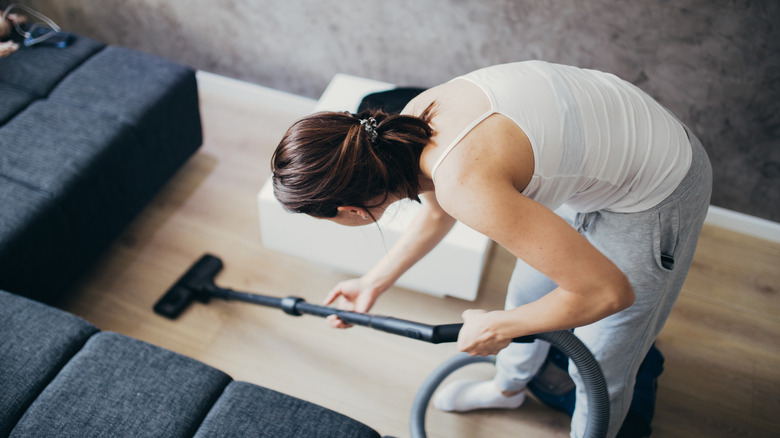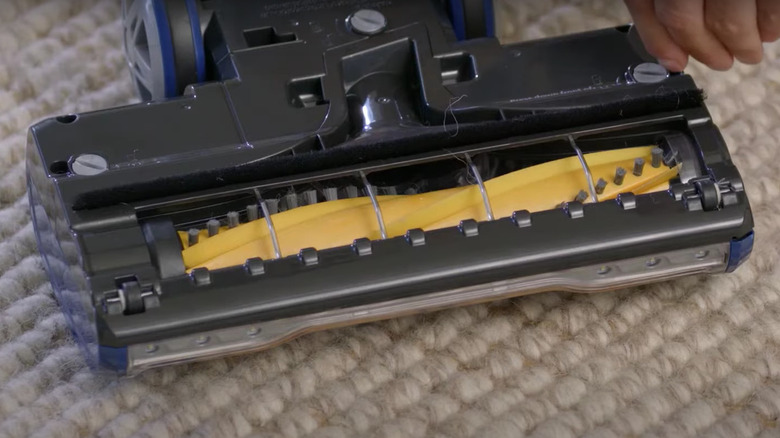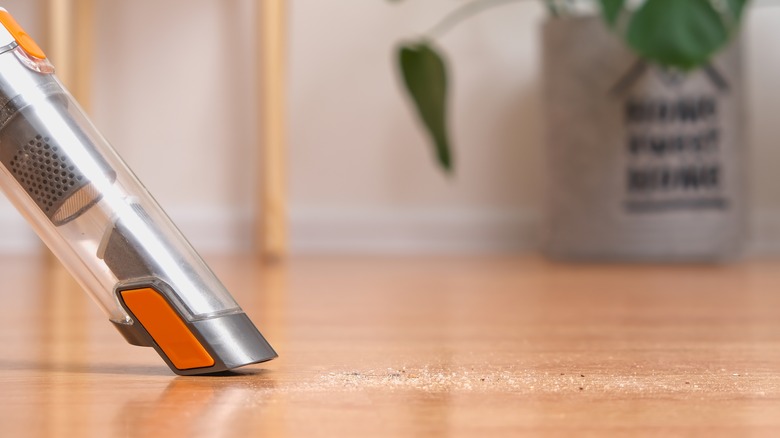The Vacuum Mistake That May Be Damaging Your Vinyl Plank Floors
We may receive a commission on purchases made from links.
Vinyl plank floors are a great option for many homeowners, as they are cheaper than hardwood and can still look modern and sleek. However, if you have these floors, it's important to maintain them properly while cleaning. Perhaps, upon close inspection of your vinyl floors, you've noticed that the surfaces are covered in small dents or scratches, and maybe you're wondering what's causing this damage. Most likely, those scratches are caused by a vacuuming mistake: cleaning your floors with a vacuum's rotating brush.
The rotating brush is an attachment that's located inside some vacuum cleaners at the intake port in the front. It has stiff bristles that spin and is used to clean thick carpets. This allows the vacuum to comb through the carpet's fibers and pick up any stuck debris or hair. However, when used on vinyl floors, those same bristles would scratch the surface instead. Even if the scuffs and marks are not apparent at first, they may become more evident over time as you continue to vacuum your floor with such a tool. Of course, this is a scenario that you will want to avoid, which you can do by using a vacuum cleaner without this piece or turning off the rotating brush setting when cleaning your hard surface floors.
The consequences of using a rotating brush on vinyl floors
Although it may seem like no big deal, using a rotating brush when vacuuming your vinyl floors could be incredibly costly, as the damage it causes can be challenging or even impossible to fix. If the whole floor is scratched, you may need to replace it entirely. Further, if your flooring has a weak top layer, it may be more susceptible to wear and tear than other types of floors, so the stiff bristles on a rotating brush would surely damage it. In addition to vinyl plank flooring, vinyl tiles are also susceptible to similar types of damage, so you should take the same amount of care when working with them, too.
Along with rotating brushes, the same damage can be caused by any other attachments that may be harsh on your floor such as beater bars. This also includes items such as nozzles and other types of cleaning brushes with rough bristles. Vacuums with rubber wheels could also cause scuff marks that may be difficult to wash away. Further, there are also many harsh liquid cleaning agents you should never use on vinyl flooring as well. While this information may be frustrating, there are specific vacuums or other tools you could clean with that will help protect your floors from damage.
Choose the right vacuum for your vinyl plank floors
Instead of using a vacuum's rotating brush or beater bar on your vinyl plank floors, it would be best if you opted for one that doesn't have these features or that allows you to turn off or reduce the speed of them. To do so, you may be able to select a hardwood or vinyl feature when cleaning, as opposed to always keeping your vacuum set to the carpet setting. To give you some examples of vacuum cleaners you could use, the Dyson V11 Torque Drive cordless vacuum cleaner is a good option for vinyl floors, and you can find it for under $500 on Amazon. If you're on a lower budget, the Shark SV110 is also recommended for hard surfaces, and you can find it on Amazon for under $150.
You could also consider only utilizing your current vacuum's hose attachment if you don't want to splash the cash on a new vacuum cleaner. Although it may not clean at the same level since its opening is smaller, this option would still be helpful for picking up any messes without causing a negative impact on your vinyl plank flooring. Or, you could simply use a broom to remove debris and dust instead of a vacuum. As a result of avoiding harsh brushes and swapping them out for friendlier options, you should find that you can easily protect your flooring from damage.


